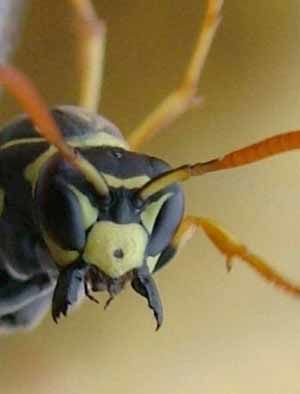
On 28 April 1945, Benito Mussolini died. He was caught running away toward the Alps, and machined gunned, along with his last mistress, near the shores of Lake Como. The son of a socialist blacksmith, Mussolini had risen up through the propagandist ranks. He was a schoolteacher, a newspaper editor, a political party organizer, and ultimately Il ("I am the man of the people") Duce. After which, he did his best to have the opposition suppressed. Critics were beaten by members of his Fascist militia, or buried in shallow graves.
3 years after Mussolini told his captors to shoot him in the chest, the Italian entomologist, Leo Pardi, wrote an article about dominance hierarchies in Polistes paper wasps. Dominant wasps tend to hit subordinates with their antennae, he pointed out; they bite them on their heads, abdomens or eyes; they grab them between their legs; or they stab them with their barbed stingers. And the higher their rank, the more likely a subordinate is to be a target. Alpha (or #1) wasps attack beta (or #2) wasps most; they attack gamma (or #3) wasps next; and they hardly bother with wasps of lower rank.
A generation after Leo Pardi, another vespologist, Mary Jane West, watched paper wasps in Michigan, and saw a few falling fights. "I have found it possible to distinguish dominants from subordinates and predict the outcome of encounters simply by comparing the postures of the two individuals. The higher is dominant," she wrote. Equals would rise up together, higher and higher, stinging and grappling and biting and antenna clashing -- till they fell through thin air, having lost their grip. Usually, one or the other wasp would eventually submit, but sometimes, they fought to the death.
Another generation after Mary Jane West, another clever wasp watcher, Kern Reeve, along with his clever student, Elizabeth Tibbetts, experimented with Polistes in the countryside around Ithaca, New York. They set up orphaned, adoptable combs, close to established nests. And they found that alpha wasp aggression declined -- because subordinates were no longer trapped.
The falling fights have always reminded me of Paradise Lost. Once upon a time, as the Age of Enlightenment began, John Milton propagandized for the parliamentary rebels in the English Civil Wars, and went on to become Oliver Cromwell's Secretary of Foreign Tongues. But then Cromwell died, the monarchy was restored, a warrant was issued for Milton's arrest, and he apologized -- in what became England's greatest epic.
"He trusted to have equal'd the most High,
If he oppos'd; and with ambitious aim
Against the Throne and Monarchy of God
Rais'd impious War in Heav'n and Battel proud
With vain attempt. Him the Almighty Power
Hurld headlong flaming from th' Ethereal Skie
With hideous ruine and combustion down
To bottomless perdition, there to dwell
In Adamantine Chains and penal Fire,
Who durst defie th' Omnipotent to Arms."
The empty habitat experiments remind me of what happened after Milton was gone. Just a generation after the civil wars were over, and just 28 years after monarchy was restored, there was another, Glorious Revolution in England. First, parliament got rid of another king; then they reestablished the monarchy on their own terms. As they put it in their 1689 Bill of Rights: the people of England had an obligation to speak freely, to elect their own representatives to parliament, to empower that parliament to raise armies, and to resist royal taxation. Or else. They'd find a way out.
Across the Pond, in another hemisphere, on 2 newly discovered continents, there were already millions of people of British descent. They were starting to set up their own nests. And they were sick and tired of putting up with dominant wasps.
References
Betzig, Laura. 2009. But what is government but the greatest of all reflections on human nature? Politics and the Life Sciences, 28: 102-105.
Betzig, Laura. 1997. Why a despot? In L. Betzig, ed., Human Nature: A Critical Reader, pp. 399-401. New York: Oxford University Press.


